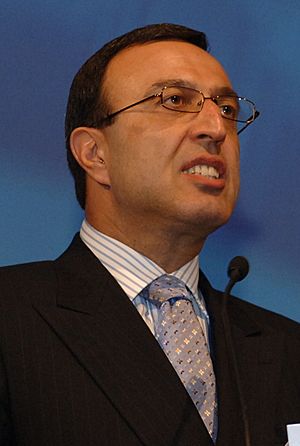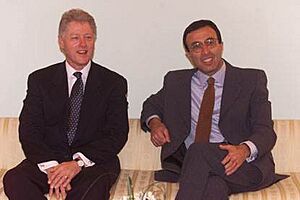Petar Stoyanov facts for kids
Quick facts for kids
Petar Stoyanov
|
|||||||||||||||||||||||||||||||
|---|---|---|---|---|---|---|---|---|---|---|---|---|---|---|---|---|---|---|---|---|---|---|---|---|---|---|---|---|---|---|---|
|
Петър Стоянов
|
|||||||||||||||||||||||||||||||

Stoyanov in 2006
|
|||||||||||||||||||||||||||||||
| 2nd President of Bulgaria | |||||||||||||||||||||||||||||||
| In office 22 January 1997 – 22 January 2002 |
|||||||||||||||||||||||||||||||
| Prime Minister |
See list
|
||||||||||||||||||||||||||||||
| Vice President | Todor Kavaldzhiev | ||||||||||||||||||||||||||||||
| Preceded by | Zhelyu Zhelev | ||||||||||||||||||||||||||||||
| Succeeded by | Georgi Parvanov | ||||||||||||||||||||||||||||||
|
|||||||||||||||||||||||||||||||
| Personal details | |||||||||||||||||||||||||||||||
| Born |
Petar Stefanov Stoyanov
25 May 1952 Plovdiv, PR Bulgaria |
||||||||||||||||||||||||||||||
| Political party | SDS (1989–1997, 2002-2007) | ||||||||||||||||||||||||||||||
| Other political affiliations |
Independent (1997–2002) | ||||||||||||||||||||||||||||||
| Spouse |
Antonina Stoyanova
(m. 1978) |
||||||||||||||||||||||||||||||
| Children | Stefan (born 1979) Teofana (born 1990) |
||||||||||||||||||||||||||||||
| Alma mater | Sofia University (LL.B, LL.M) | ||||||||||||||||||||||||||||||
| Occupation |
|
||||||||||||||||||||||||||||||
Petar Stefanov Stoyanov (born on May 25, 1952) is a Bulgarian statesman and politician. He served as the second President of Bulgaria from 1997 to 2002. As a member of the Union of Democratic Forces, he won the second democratic election in modern Bulgarian history. During his time as president, Bulgaria made big steps toward joining NATO and the European Union.
Contents
Early Life and Political Start
Petar Stoyanov was born in Plovdiv, Bulgaria. After finishing high school, he studied law at the Saint Kliment Ohridski University of Sofia. He graduated with honors in 1976. For the next fifteen years, he worked as a civil lawyer in Plovdiv. Besides his native Bulgarian, he also speaks English and German.
Stoyanov became involved in politics in 1990. This was shortly after big political changes happened in Bulgaria at the end of 1989. He helped start a Democracy Club in Plovdiv. Later that year, he became a spokesperson for the Plovdiv branch of the Union of Democratic Forces (UDF). This was a new group that opposed the old ruling parties.
In 1991, Stoyanov joined Bulgaria's first government after the communist era. He served as the Deputy Minister of Justice. In 1993, the UDF-led government lost a vote and was replaced. In May 1993, Stoyanov became the head of the UDF Legal Council.
In 1994, he was elected as a Member of Parliament. He became the Deputy Chairman of the UDF group in Parliament. He also served as Deputy Chairman of the Parliamentary Commission on Youth, Sports, and Tourism. In 1995, he became Deputy Chairman of the UDF, focusing on domestic policy.
Becoming President
On June 1, 1996, Petar Stoyanov won the UDF's presidential primary election. He received 66% of the votes. This made him the presidential candidate for the UDF. In the first round of the presidential election, he received the most votes. He was ahead of the socialist candidate Ivan Marazov. In the second round, he won against Marazov by a large margin.
Stoyanov officially became President on January 22, 1997. He was the first Bulgarian Head of State after World War II who had never been a member of the Bulgarian Communist Party.
Solving a National Crisis
Early in his presidency, Petar Stoyanov played a key role in a very difficult time for Bulgaria. For over a month, many thousands of citizens protested against the government led by the Bulgarian Socialist Party (BSP). After the Prime Minister resigned, the BSP wanted to form a new government. However, President Stoyanov refused to approve it.
Instead, on February 4, 1997, he called a meeting of the National Security Consultative Council. This council included representatives from all political parties in Parliament. During this meeting, the BSP was forced to give up their plan to form a new government. New elections were then scheduled. President Stoyanov appointed a temporary government. This government was led by Stefan Sofianski, the Mayor of Sofia.
After the new elections, the UDF won most of the seats in Parliament. They formed a government that served a full term from 1997 to 2001. This was the first time a Bulgarian government had done so since 1989.
Important Steps for Bulgaria
At President Stoyanov's request, the temporary government officially asked for Bulgaria to join NATO. Petar Stoyanov also helped a lot during the Kosovo crisis. He strongly supported the NATO alliance.
During his time as president, Bulgaria started serious talks to join the European Union. The country also signed an important agreement to protect national minorities. Bulgaria also became a temporary member of the United Nations Security Council.
On January 12, 1998, the original old manuscript of Istoriya Slavyanobolgarskaya was returned to the Zograf Monastery library. This happened at his request.
For the first time ever, a sitting US President visited Bulgaria. This was when Bill Clinton made a historic three-day visit from November 21 to 23, 1999. This visit was at Stoyanov's invitation.
During his time in office, Stoyanov became the first Head of State in the world to sign a law using an electronic signature. Petar Stoyanov has been a member of the Internet Society - Bulgaria since July 21, 2000.
2001 Presidential Election
Petar Stoyanov ran for a second term as president in 2001. However, he lost in the second round to Georgi Parvanov. This happened even though Stoyanov was ahead in early polls.
During a TV debate with other candidates, Stoyanov showed a document about one of them. This action may have caused some voters to change their minds. Many people believe this led them to support Parvanov, who seemed more calm.

During the election campaign, Petar Stoyanov did not get full support from all political parties. The Movement for Rights and Freedoms supported Georgi Parvanov. The UDF leaders made unclear statements during the campaign. The new party of former monarch Simeon Saxe-Coburg-Gotha, the NDSV, was expected to support Stoyanov. However, Simeon Saxe-Coburg Gotha, who was then prime minister, announced he would not vote in the second round. This disappointed his supporters.
Petar Stoyanov came in second in the first round of voting with 34.9%. Georgi Parvanov was first with 36.3%. Stoyanov lost the final vote to Parvanov by 8.3%.
Stoyanov's loss in this election, along with the UDF's poor performance in earlier parliamentary elections, marked the start of a difficult period for the Union of Democratic Forces.
Later Political Career
In September 2004, Stoyanov was appointed as a Special Envoy for Moldova. This role was given to him by the Chairman-in-Office of the OSCE.
In 2005, Stoyanov returned to active politics. He was elected as a member of the 40th National Assembly in the parliamentary election that year. He became a member of the European Integration Committee. He also joined the State Administration Affairs Committee. Because the UDF had a poor election result, he became a strong critic of the party leader. On October 1, 2005, the UDF National Conference elected him as Chairman of the party.
On May 20, 2007, the first European Parliament election in Bulgaria was held. Stoyanov led the UDF list but was not elected. The UDF did not get enough votes to pass the election threshold. This led to his resignation from the leadership of the Union of Democratic Forces on May 22, 2007.
Other Activities
Stoyanov is an Honorary Co-Chair for the World Justice Project. This project works to strengthen the Rule of Law around the world. It aims to help communities have more opportunities and fairness. In 2002, Petar Stoyanov gave lectures in the US. He spoke at places like John F. Kennedy School of Government at Harvard University and New York University.
In 2022, Stoyanov, along with Iuliana Metodieva and Mitko Novkov, started a campaign. This campaign honored volunteers and groups who helped refugees from Ukraine. This was during the refugee crisis in Bulgaria after the Russian invasion of Ukraine. The main award for overall help was given to Olena Kotseva from the Mati Ukraine association.
Family Life
Petar Stoyanov is married to Antonina Stoyanova. They have a son named Stefan, born in 1979, and a daughter named Fany, born in 1990. His younger brother, Emil Stoyanov, used to be a MEP for the GERB party.
Awards and Recognition
 Slovakia: Grand Cross of the Order of the White Double Cross (1997)
Slovakia: Grand Cross of the Order of the White Double Cross (1997) Romania: Grand Cross with Sash of the Order of the Star of Romania (1998)
Romania: Grand Cross with Sash of the Order of the Star of Romania (1998) Austria: Grand Star of the Decoration of Honour for Services to the Republic of Austria (1999)
Austria: Grand Star of the Decoration of Honour for Services to the Republic of Austria (1999) Spain: Collar of the Order of Civil Merit (1999)
Spain: Collar of the Order of Civil Merit (1999) Denmark: Knight of the Order of the Elephant (2000)
Denmark: Knight of the Order of the Elephant (2000) Palestine: Order of Bethlehem (2000)
Palestine: Order of Bethlehem (2000)
See also
 In Spanish: Petar Stoyanov para niños
In Spanish: Petar Stoyanov para niños
 | Sharif Bey |
 | Hale Woodruff |
 | Richmond Barthé |
 | Purvis Young |

